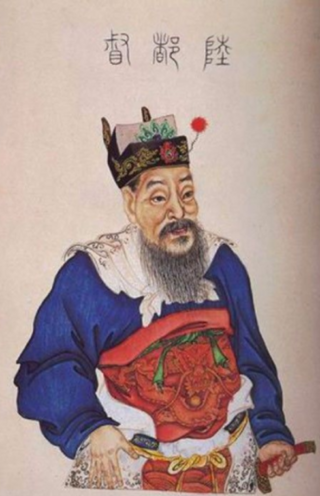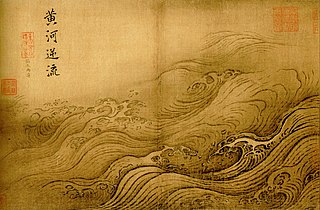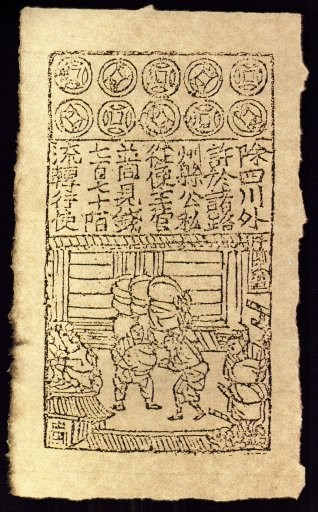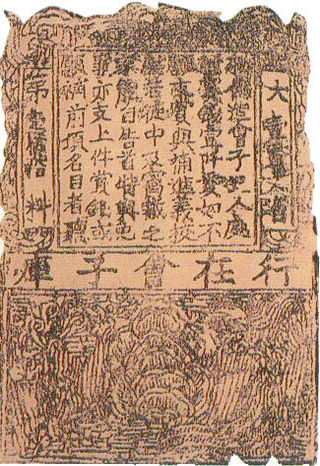
Hongwu Emperor, also known by his temple name as the Emperor Taizu of Ming (明太祖), personal name Zhu Yuanzhang, courtesy name Guorui, was the founding emperor of the Ming dynasty, reigning from 1368 to 1398.

Lu Kang, courtesy name Youjie, was a Chinese military general and politician of the state of Wu during the Three Kingdoms period of China. He was the second son of Lu Xun, the third Imperial Chancellor of Wu. Lu Kang inherited the mantle of his father but was less involved in politics as he served mainly in the Wu military. He rose to prominence during the reign of the fourth and last Wu emperor, Sun Hao. In 272, he successfully suppressed a rebellion by Bu Chan and fended off invading forces from Wu's rival, the Jin dynasty. After the Battle of Xiling, he actively pursued a policy of détente with the Jin general Yang Hu at the Wu–Jin border. At the same time, he constantly submitted memorials to Sun Hao, urging the tyrannical emperor to change his ways and govern with benevolence, but his advice fell on deaf ears. In 280, about six years after Lu Kang's death, the Jin dynasty launched a campaign against Wu and conquered Wu within a year.

Huaxia is a historical concept representing the Chinese nation, and came from the self-awareness of a common cultural ancestry by the various confederations of pre-Qin ethnic ancestors of Han people.

Jiaozi was a form of promissory note which appeared around the 11th century in the Sichuan capital of Chengdu, China. Numismatists regard it as the first paper money in history, a development of the Chinese Song Dynasty. Early Jiaozi notes did not have standard denominations but were denominated according to the needs of the purchaser and ranged from 500 wén to 5 guàn. The government office that issued these notes or the Jiaozi wu demanded a payment or exchange fee of 30 wén per guàn exchanged from coins to banknote. The Jiaozi were usually issued biannually. In the region of Liang-Huai these banknotes were referred to as Huaijiao (淮交) and were introduced in 1136. Still, their circulation stopped quickly after their introduction. Generally the lower the denominations of the Jiaozi the more popular they became, and as the government was initially unable to regulate their production properly, their existence eventually led to undesirably high inflation rate.

The Huizi, issued in the year 1160, was the official banknote of the Chinese Southern Song dynasty. It has the highest amount of issuance among various banknote types during the Song dynasty. Huizi notes came on three-colour printed paper and their usage was heavily promoted by the government of the Southern Song dynasty, the Huizi were backed by 280,000 guàn of copper cash coins.
The literary inquisition, also known as speech crime (以言入罪), refers to official persecution of intellectuals for their writings in China. The Hanyu Da Cidian defines it as "the ruler deliberately extracts words or phrases from intellectual's writings and arbitrarily accuse him in order to persecute him" ("旧时谓统治者为迫害知识分子,故意从其著作中摘取字句,罗织成罪"). The inquisition took place under each of the dynasties ruling China, although the Ming dynasty was particularly notorious for the practice.

The Jingnan campaign, or Jingnan rebellion, was a three-year civil war from 1399 to 1402 in the early years of the Ming dynasty of China. It occurred between two descendants of the Ming dynasty's founder Zhu Yuanzhang: his grandson Zhu Yunwen by his first son, and Zhu Yuanzhang's fourth son Zhu Di, Prince of Yan. Though Zhu Yunwen had been the chosen crown prince of Zhu Yuanzhang and been made emperor upon the death of his grandfather in 1398, friction began immediately after Yuanzhang's death. Zhu Yunwen began arresting Zhu Yuanzhang's other sons immediately, seeking to decrease their threat. But within a year open military conflict began, and the war continued until the forces of the Prince of Yan captured the imperial capital Nanjing. The fall of Nanjing was followed by the demise of the Jianwen Emperor, Zhu Yunwen. Zhu Di was then crowned the Ming Dynasty's third emperor, the Yongle Emperor.

The Ming Ancestors Mausoleum, Ming Ancestor Tomb, or Zuling Tomb was the first imperial mausoleum complex of the Ming dynasty, constructed at a geomantically advantageous site near the inlet of the Huai River into the west side of Hongze Lake in present-day Xuyi County, Huai'an Prefecture, Jiangsu Province, China. Built between 1386 and 1413 by Zhu Yuanzhang—the Hongwu Emperor who founded the Ming—and his son Zhu Di the Yongle Emperor to display their filial piety, it was located north of the town of Sizhou, where the ancestors of the dynasty had lived. The remains of the Hongwu Emperor's grandfather Zhu Chuyi are known to have been disintered and moved to the site. He, his father Zhu Sijiu, and his grandfather Zhu Bailiu were posthumously revered at the site as honorary emperors, Zhu Chuyi as the Xi Ancestor of the Ming (Xizu), Zhu Sijiu as the Yi Ancestor of the Ming (Yizu), and Zhu Bailiu as the De Ancestor of the Ming (Dezu).
Little China is a term referring to a politico-cultural ideology and phenomenon in which various Japanese, Korean and Vietnamese monarchs identified themselves as the "Central Kingdom" or "Central State," and regarded themselves to be legitimate successors to the Chinese civilization. Informed by the traditional Chinese concepts of Sinocentrism and Hua–Yi distinction, this belief became more apparent after the Manchu-led Qing dynasty had superseded the Han-led Ming dynasty in China proper, as Tokugawa Japan, Joseon Korea and Nguyễn Vietnam, among others, perceived that "barbarians" had ruined the center of world civilization.

The Hongwu Tongbao was the first cash coin to bear the reign name of a reigning Ming dynasty Emperor bearing the reign title of the Hongwu Emperor. Hongwu Tongbao cash coins officially replaced the earlier Dazhong Tongbao coins, however the production of the latter did not cease after the Hongwu Tongbao was introduced. The government of the Ming dynasty placed a greater reliance on copper cash coins than the Yuan dynasty ever did, but despite this reliance a nationwide copper shortage caused the production of Hongwu Tongbao cash coins to cease several times eventually leading to their discontinuation in 1393 when they were completely phased out in favour of paper money. In the year 1393 there were a total of 325 furnaces in operation in all provincial mints of China which had an annual output of 189,000 strings of cash coins which was merely 3% of the average annual production during the Northern Song dynasty.

The Great Ming Treasure Note or Da Ming Baochao was a series of banknotes issued during the Ming dynasty in China. They were first issued in 1375 under the Hongwu Emperor. Although initially the Great Ming Treasure Note paper money was successful, the fact that it was a fiat currency and that the government largely stopped accepting these notes caused the people to lose faith in them as a valid currency causing the price of silver relative to paper money to increase. The negative experiences with inflation that the Ming dynasty had witnessed signaled the Manchus to not repeat this mistake until the first Chinese banknotes after almost 400 years were issued again in response to the Taiping Rebellion under the Qing dynasty's Xianfeng Emperor during the mid-19th century.

The Zhuangpiao, alternatively known as Yinqianpiao, Huipiao, Pingtie (憑帖), Duitie (兌帖), Shangtie (上帖), Hupingtie (壺瓶帖), or Qitie (期帖) in different contexts, refer to privately produced paper money made in China during the Qing dynasty and early Republic of China periods issued by small private banks known as qianzhuang. Other than banknotes qianzhuang also issued Tiexian.

Standard cash, or regulation cash coins, is a term used during the Ming and Qing dynasties of China to refer to standard issue copper-alloy cash coins produced in imperial Chinese mints according to weight and composition standards that were fixed by the imperial government. The term was first used for Hongwu Tongbao cash coins following the abolition of large denomination versions of this cash coin series.
Tao Huang, courtesy name Shiying, was a Chinese military general and politician in Eastern Wu during the Three Kingdoms period and later for the Jin dynasty (266–420). Tao Huang was most notable for his administration of Jiaozhou for more than twenty years, during the Eastern Wu and Western Jin eras. He was also responsible for Wu's victory against Jin in Jiao between 268 and 271, one of the few major victories Wu had over Jin in the final years of the Three Kingdoms.
Zu Yue (祖約), courtesy name Shishao, was a Chinese military general and warlord of the Jin dynasty. He was the younger brother of the famed Jin general Zu Ti who marched north to reclaim lost lands from the barbarians. After Ti's death in 321, Zu Yue succeeded him but was said to have lacked his talents. In 327, dissatisfied with his treatment by the Jin court, he joined forces with Su Jun and took over the capital. However, he was defeated by loyalist forces in 329 and fled to Later Zhao, where he and his family were executed by Shi Le.
Cheng Xia was a Chinese minister of Later Zhao during the Sixteen Kingdoms period. His sister, Consort Cheng, was a wife of Shi Le and also the mother to the Crown Prince Shi Hong. As Shi Le's brother-in-law, he was thus given an important role in the Later Zhao administration. He was also strong opposition to Shi Le's powerful nephew, Shi Hu, who he feared would usurp the throne once Shi Le passes. His attempts at diminishing Shi Hu's influence captured his scorn, and after he launched a coup in 333 following Shi Le's death, Shi Hu had Cheng Xia and his ally Xu Guang executed.
Qi Wannian, or Qiwannian, was an ethnic Di chieftain and rebel leader during the Western Jin dynasty of China. In 296, he became the leader of a tribal uprising against Jin in Qin and Yong provinces that lasted until 299. The rebellion raised concerns among some ministers regarding the tension between the Han and tribal people while also triggering a mass migration of refugees into Hanzhong and Sichuan.
Zhu Shizhen, born Zhu Wusi, was the father of Zhu Yuanzhang, the founding emperor of the Ming dynasty. He was a native of Jurong. The ancestors of the Zhu family had lived in Pei and later moved to Jurong. His father, Zhu Chuyi, moved to Xuyi, Si Prefecture, and Zhu Shizhen moved again to Zhongli, Haozhou.
Longfeng was the era name (nianhao) of Han Lin'er, who was a rebel and emperor of Han Song (1355–1367) during the Yuan dynasty of China. It was used for a total of 12 years. After Han Lin'er's death, his subordinate Zhu Yuanzhang, Prince of Wu, changed the next year (1367) to "Wu 1", and in 1368, to "Hongwu", and established the Ming dynasty.
Wang Guangyang, courtesy name Chaozong (朝宗), was a Chinese official who served as a chancellor during the reign of the Hongwu Emperor in the Ming dynasty. Serving in both the military and civil bureacracies, he ascended as high as the position of Grand Chancellor of the Right (右丞相).











